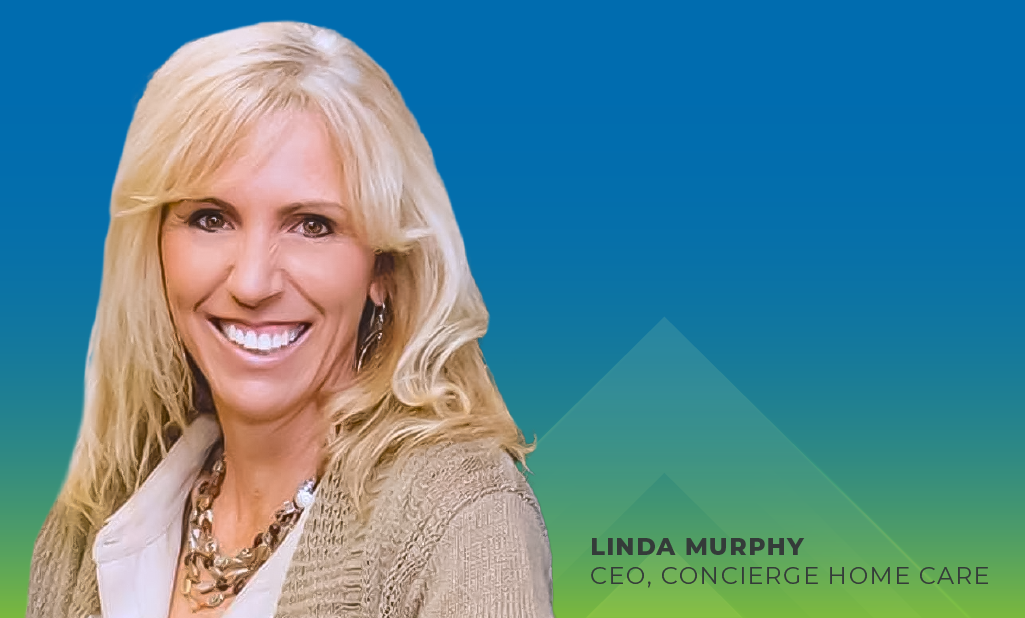As COO and founder of Concierge Home Care, Linda Murphy leads an organization dedicated to improving the lives of seniors throughout Florida, assisting with the management of their illnesses while optimizing their healthy behaviors to allow them to remain in their homes for as long as possible.
Through the Fast Forward Series, Murphy shares insight into the next three years of in-home care, including the impact home-based care continues to make on society and the health care industry as a whole. By building the right team and creating a care delivery model that is considerate of patients’ physical and social needs, Murphy shares her outlook for achieving better outcomes and more patient satisfaction at a reduced cost of care.
HHCN: What was the path that led you to the founding of Concierge Home Care?
Murphy: I’m a nurse, first and foremost. I fell into home care after I did about 15 years as an ER nurse followed by a bout with cancer. When I was recovering from stage 3 breast cancer, I ran into a friend who owned a home care agency. She asked me to come work for her. That’s when I fell in love.
I built my career from the ground up, starting as a nurse out in the field then moving into a director role until I eventually ran a few offices. By the time I left Almost Family, I was running 31 offices across Florida before deciding to go out and do it on my own with a couple of wonderful partners and a mentor I had had for many years.
Where do you see yourself and your company in the next three years?
I see us as the largest provider in the Southeast. We’re known for our culture, quality, innovation and a mission of “caring for people that care for people.”
What do you think will be the most significant challenge for your company during that time?
Staffing is a big one. I think the demand for home care will only increase as our aging population increases. I think we’ve got to be very creative in our staffing models, which is why we are mapping out residency programs. We’ve been doing telehealth for several years, and I think we have to be considerate of working-from-home models so we meet the needs of our people. Culture is going to be one of the biggest factors to consider as we evolve because it is the foundation of who and what we are.
What do you see as the greatest source of health care disruption in that time period?
Consolidation is going to be a great source of disruption, but it can be positive or negative. Competition drives excellence and innovation so if you’re not growing, you’re dying. I want to make sure everyone has a voice and there’s collaboration. The key to answering the needs of our aging population is through that collaboration and hope that it doesn’t go away as consolidation occurs.
What do you see as the most exciting economic or bottom-line opportunity during that time?
COVID launched the home care industry forward from an awareness perspective. I think the public has gained a greater respect for the value we provide. During the pandemic, home care met patient challenges and needs at home. We expanded into more acute-care-at-home programs and even virtual care. We let everyone in the health care industry and society know just how essential home health care workers are, and we showed them what we can accomplish in the home.
What do you see as the greatest technological advancement on the horizon with respect to your business?
AI and integration are going to be key. If we can start to have more interoperable systems to connect hospitals, private duty, palliative care, home care and primary care physicians, we will be able to improve health outcomes across the board.
That could lead to less duplication of services and ensure we’re putting our money where it will have the greatest impact. If we could do a better job of integrating post-acute and primary care medicine along the way and improve communication between all those levels, it would positively affect everyone involved in the patient journey.
What will be the greatest social influence on the industry during this time?
It feels like we’re at the health care table, when previously we weren’t. My hope is that we’ll start to be viewed as a solution and not a cost center. I think we will also start to see them pay us fairly for what we do.
I’d love to see us recognize telehealth as a reimbursable option alongside our in-home visits because with the shortage of staff, we’ve been able to prove that it reduces the overall cost and increases our outcomes and patient satisfaction. We know that the population is aging. Let’s really consider some of the regulatory pieces that we have in place that prevent us from [expanding telehealth].
Complete the sentence. Three years from now, I hope care delivery will be …
More integrated, more holistic and considerate of the physical and the social needs of our patients. I think when we approach care that way, we’re going to get better outcomes, more patient satisfaction and reduce the overall cost of care.




